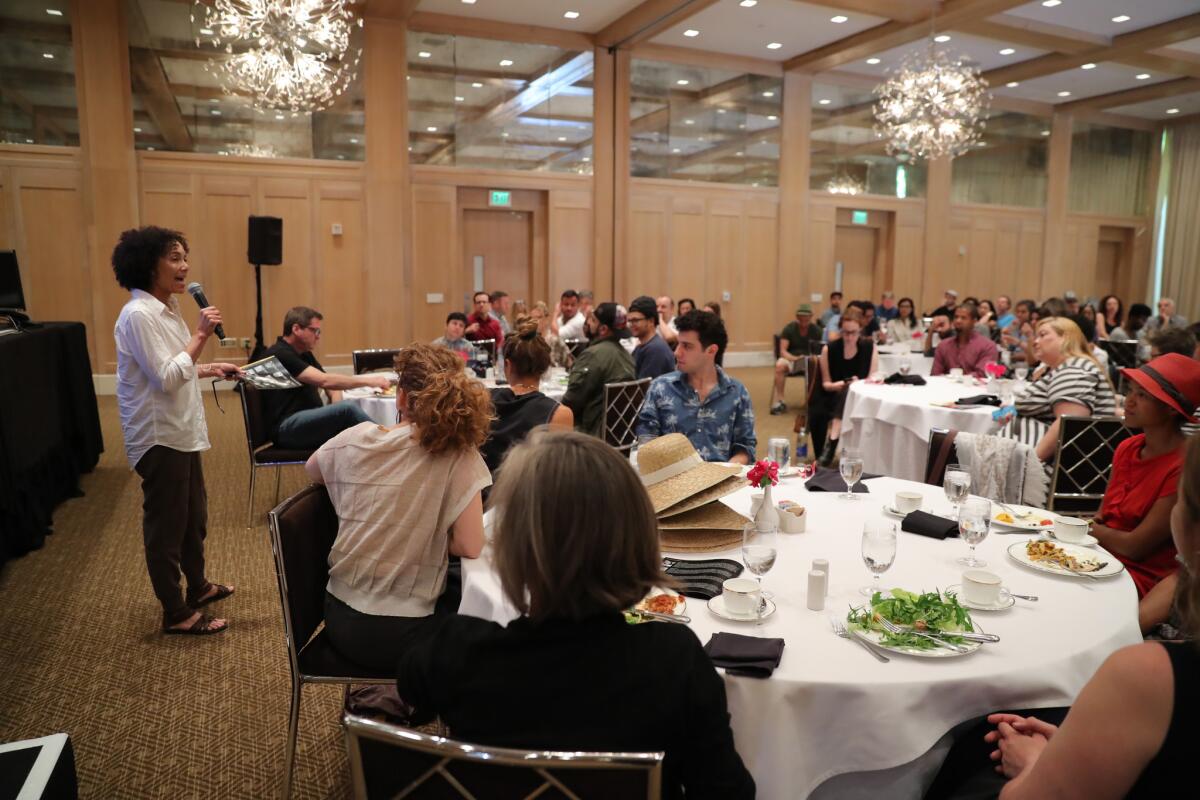Inside L.A. Film Festival’s desert retreat, a meeting of rising indie filmmakers from around the world

- Share via
Filing into the ballroom of the Parker Palm Springs hotel, nearly 60 filmmakers from across the world were ready for 24 hours of rest, relaxation and recharge.
Bused from Los Angeles, the exclusive group was made up of the writers, directors and producers of films premiering at the Los Angeles Film Festival through June 9. But before the hustle and bustle of screenings, media interviews and audience Q&As — and hopefully meetings with studio executives and movie distributors — Film Independent, the festival’s sponsor, wanted to give the creators a moment to just take it all in, make some connections and prepare for the ride.
As festival director Stephanie Allain stated at the start of the retreat on Tuesday, “It’s time to unplug because you’re about to get really plugged in.”
The retreat is held annually for the select few that rose above the festival’s nearly 6,000 submissions, and has been a staple for about 10 years. Though it’s one of the biggest line items of its annual budget, Film Independent sees the gathering as important to its mission: uplifting diverse voices and fostering needed connections to the industry.
In addition to granting time to unwind for the filmmakers, some of whom finished their movies as recently as last week (one finished it the day of), the hope is that folks will mix and mingle with each other as well as a host of honored guests, building a network that many — especially first and second-time filmmakers —might never have otherwise formed.
People like Shola Amoo, a London graduate of the National Film and Television School whose film “A Moving Image,” about gentrification in Brixton — think historical Harlem, but in the United Kingdom — premieres Sunday. It’s his first feature-length picture.
Or Maria Govan, a Bahamian filmmaker whose second feature “Play the Devil,” which premieres Saturday, was shot entirely in Trinidad and tackles masculinity, privilege and sexuality against the backdrop of Carnival.
Or Deborah Riley Draper, an Atlanta-based marketer and advertiser whose documentary “Olympic Pride: American Prejudice” charts the story of the 17 other black athletes (in addition to Jesse Owens) who battled American racism and faced Hitler at the 1936 Summer Olympic Games in Berlin.
Or Mel Finell, a 2015 graduate of UCLA’s MFA program whose comedy “Sensitivity Training,” premiering Sunday, centers on a female microbiologist forced by her employer to take sensitivity training to curb her abrasive and sometimes offensive attitude.
Media is typically restricted from covering the one-day retreat in order to provide the safest of places for creators to discuss the many negative and trying aspects of the industry without the fear of being quoted. In order to maintain this environment, when The Times was allowed to be a fly on the wall, formal interviews were limited. This year was only the second time that a reporter was allowed to attend.
Throughout the day, filmmakers had the chance to glean advice from and use as resources people such as Catherine Collins, film officer for the State Department; Peter Trinh, an ICM agent in the international and independent film department, and Funa Maduka who manages global content acquisition of independent films at Netflix. Also present were executives from post-production facilities EFILM and Company 3, as well as HBO and Kodak, companies that sponsored the retreat.
The backdrop for the networking was the Parker’s 13-acre upscale complex less than five minutes from downtown Palm Springs, with amenities including an on-site bistro, diner and lemonade stand; tennis courts; three pools; a fire pit and croquet lawn; hammocks strewn between palm trees; rooms with private entrances and patios; a 24-hour fitness room and spa. One could literally, and many did, get lost.
But among the free time and catered meals, Film Independent staged conversations aimed at helping to educate the filmmakers. One, led by EFILM and Company 3, focused on the benefits of color correction in film while another, hosted by Film Independent curator Elvis Mitchell, showcased advice from filmmaker Ondi Timoner.
Timoner has shown most, if not all of her films, at LAFF. She’s in pre-production on “Mapplethorpe,” a film about the famed photographer, and her filmography includes 2004’s “Dig!,” 2009’s “We Live in Public” and last year’s “Brand: A Second Coming.” She implored the onlooking filmmakers to use the evening to build as many relationships as possible because “the greatest resource we have is each other.”
“You really shouldn’t be entering any relationship — lawyer, agent, publicist, distributor — unless you’ve vetted them by people who are filmmakers and have worked with them,” she said in an interview. “We can help each other dodge a lot of bullets and it really is necessary when you have limited resources,” as all independent filmmakers do.
As a former retreater herself, she summed up her realization of its purpose, in hindsight.
“A retreat like this allows everyone to meet in the physical world to allow serendipity to occur in a natural setting, to give 24 hours of a much-needed breather,” she said. “It’s your victory lap.”
The evening was capped by an after-party of sorts at the complex’s Gene Autry House, once lived in by the singing cowboy himself. As the libations flowed, the filmmakers continued to let loose, many busting moves to the Prince tracks playing in the background on the estate’s terrace. Bonds were made as they swapped business cards, traded production horror stories and reflected on the opportunity afforded to them to premiere their unique, diverse films at a mainstream festival such as this.
As one filmmaker could be overheard saying, “If this is the beginning, I can’t wait for what the end will be.”
Get your life! Follow me on Twitter: @TrevellAnderson.






